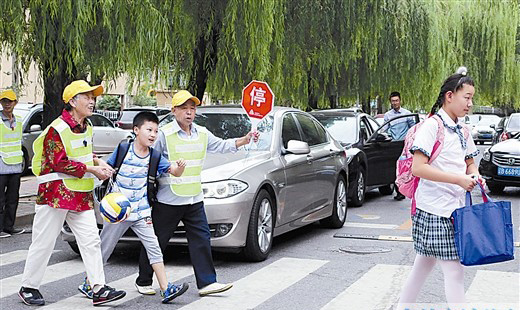Building culturally advanced cities requires public involvement

Children cross the street with the help of volunteers in Dalian, Liaoning Province. The city won the title of “National Civilized City” for five times from 2005 to 2017.
As the national competition for the title of culturally advanced city heats up, cities across the nation are striving to improve residents’ quality of life, cultural literacy and cultural tastes.
In the fifth round of competition for the title of culturally advanced cities held in 2017, 89 cities and districts across the nation won this distinction. Li Hongyu, director of the Center for Research on Urban Policy at the Institute for Urban and Environmental Studies under the Chinese Academy of Social Sciences, said that this competition provides an operable plan to improve the cultural quality of a city.
This competition has prompted local governments to improve public facilities and administration and more strictly implement rules for traffic order, Li said. The situation of public security and environmental hygiene has also been improved, she added.
A city cannot be recognized as culturally advanced without public participation. The public is both the subject of behavior and the beneficiary of the establishment of a culturally advanced city. Liu Gang, a professor of economics from Nankai University, said the cultural literacy of the people lays the foundation for the establishment of a culturally advanced city.
In order to inspire the public to take an active role in competition, three tasks need to be completed, Liu said. First, norms for public behaviors should be established so that every citizen can be part of the picture of a culturally advanced city. Second, the public should be encouraged to take part in city planning, increasing their sense of ownership of the city. Last of all, citizens should be provided opportunities to express their appeals for urban development. Through this, the city governments can be pushed to improve their planning for urban development, Liu said.
The key to inspiring the public to participate in establishing a culturally advanced city is to make them realize that by participating in the process, they are actually improving their own living conditions, said Hu Jieren, an associate professor of law from Tongji University. At the same time, strengthening the communication between local governments and citizens is also crucial, Hu said.
When the people gain real benefits from the competition for the title of a culturally advanced city, the cultural literacy and levels of civilization of a city will improve correspondingly. Li said that during the establishment of a culturally advanced city, it is important to closely associate the targeted indicators with public awareness and interests in reality. She suggested that social consensus be reached through publicizing the establishment of a culturally advanced city. By pursuing every indicator evaluated in the competition, municipal governments should achieve social progress and noticeably make people’s lives more convenient through measures like improving community services, public facilities, traffic order and professional code of conduct, she said.
In terms of government departments, Hu said that it is crucial for the administrative duties of various departments to be clearly delegated and performed with high effectiveness. A joint mechanism for law enforcement may be established to address issues that concern departments of public health, business, tax and transportation, Hu said. Meanwhile, the supervision mechanism should be strengthened by establishing institutions on notification, rectification, return visit and inspection, she suggested.

 PRINT
PRINT CLOSE
CLOSE